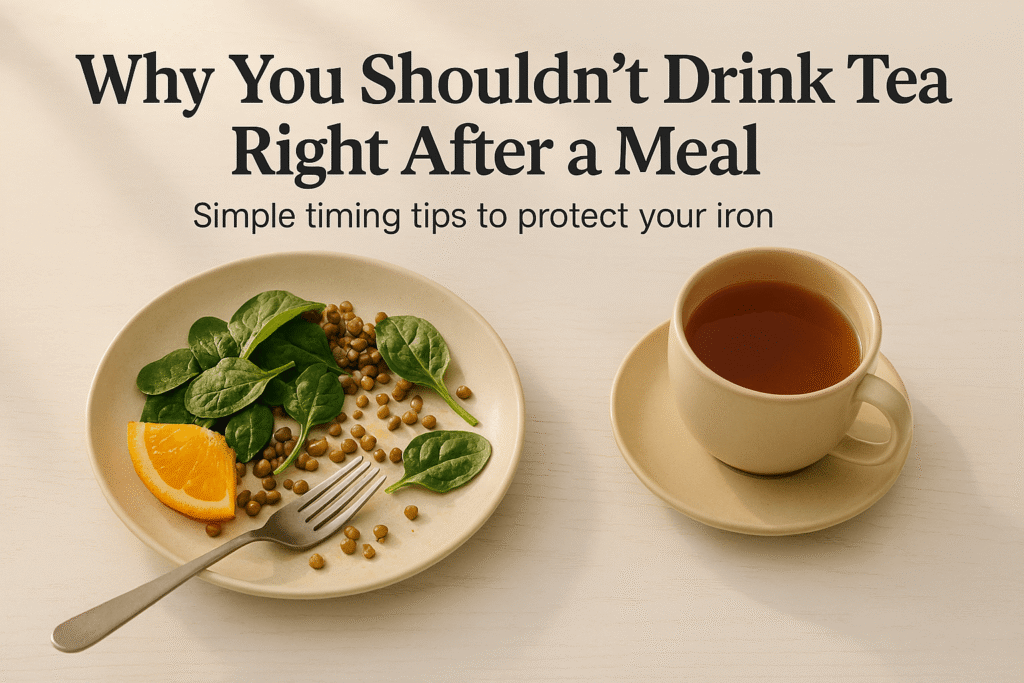
Cup of tea beside a plate of salad with orange wedge
Drinking a comforting cup of tea after a meal is a common habit, but there are several well-supported reasons to pause before taking that first sip. This article explores the science behind why you shouldn’t drink tea right after a meal, offering clear, empathetic guidance and practical suggestions for better habits.
Quick takeaways (read first)
- Drinking tannin-rich tea with or immediately after meals can reduce iron absorption, especially non-heme iron from plant foods. (PMC, PubMed)
- People at risk of iron deficiency (women of childbearing age, pregnant people, vegetarians/vegans, those with GI conditions) should avoid tea around main meals. (PubMed)
- For most healthy adults, an occasional cup of tea after a meal won’t cause big problems, but timing matters: wait about 1–2 hours after eating to minimize interference. (Health, PMC)
- Tea’s effects on digestion and blood-sugar response are mixed — there’s no strong evidence that a normal cup of tea meaningfully “slows digestion” for everyone. Some studies even show neutral or beneficial effects. (PMC, ScienceDirect)
What in tea causes concern? (short science)
Tea (black, green, matcha, and many herbal blends) contains polyphenols, especially tannins and catechins. These compounds are powerful antioxidants, which is good, but they also bind to certain minerals in the gut (notably non-heme iron) and form complexes the body can’t absorb well. Multiple clinical and lab studies show that tea consumed with meals can significantly reduce iron absorption from that meal. (PMC, PubMed)
Who is most at risk?
- Women of childbearing age (heavy menstrual losses) and pregnant people. (PubMed)
- Vegetarians and vegans (their iron is mostly non-heme and more susceptible). (PMC)
- People with known iron-deficiency anemia or poor iron stores. (PubMed)
- Those with gastrointestinal disorders that already reduce absorption (e.g., celiac disease, inflammatory bowel disease).
If you’re in one of these groups, it’s sensible to be deliberate about the timing of tea and other tannin-rich drinks.
How big is the effect?
Studies vary, but classic research has reported large reductions in non-heme iron absorption when tea is taken with a meal (some studies show reductions up to ~60% depending on tea strength and the meal). That doesn’t mean one cup will instantly cause anemia, but habitual patterns (tea with every meal, especially if the diet is plant-based) raise risk over time. (PubMed, nutritionist-resource.org.uk)
Does adding milk stop the problem?
Short answer: not reliably. Small amounts of milk in tea do not fully prevent tea’s effect on iron absorption, and studies on gastric emptying show that modest milk addition doesn’t change emptying time. In practice, milk may slightly change the composition of the drink but won’t reliably neutralize tannins’ effect on iron. (PubMed, Wiley Online Library)
What about digestion, bloating, or blood sugar?
- Gastric emptying: Research shows mixed results. Some meals paired with certain beverages alter gastric emptying slightly, but typical tea consumption after a normal meal does not consistently cause clinically significant slowing of digestion in healthy people. (PMC, PubMed)
- Post-meal blood glucose: A few recent trials suggest adding tea (or lemon to tea) can alter postprandial glycemia depending on meal composition, but findings are inconsistent. Tea may modestly affect glycemic response in some contexts, not a universal harm. (ScienceDirect)
Are there any benefits to drinking tea after meals?
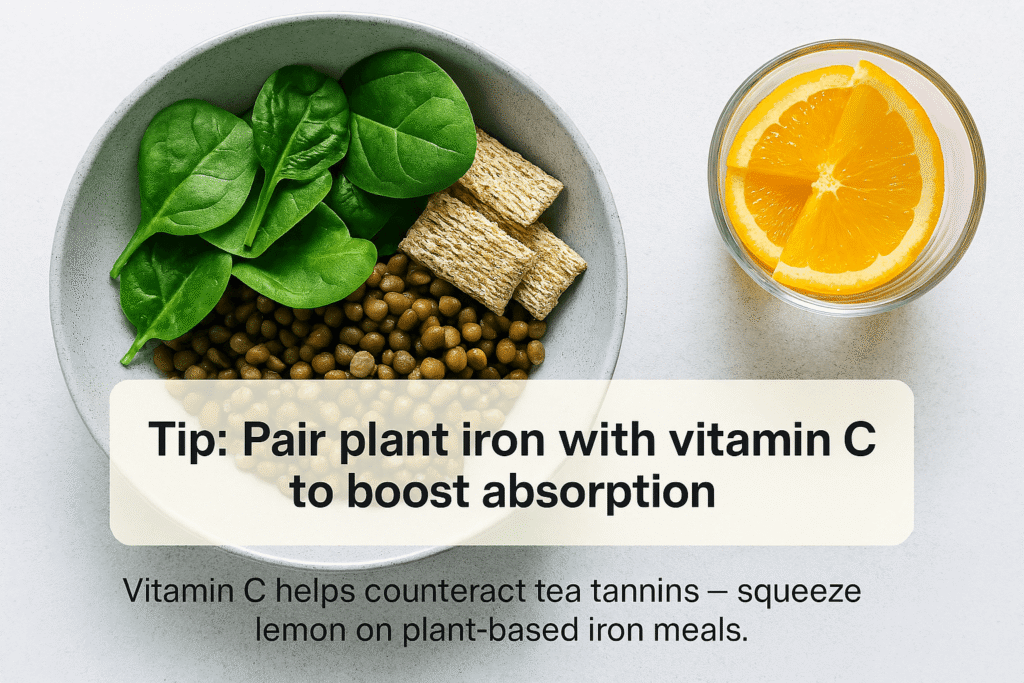
Yes — tea has proven antioxidants, and some population studies even link habitual tea drinking with better bone density and lower osteoporosis risk, as well as cardiovascular benefits. So tea isn’t “bad” — it’s timing with meals that matters for iron. (Frontiers, PMC)
Practical, evidence-based recommendations
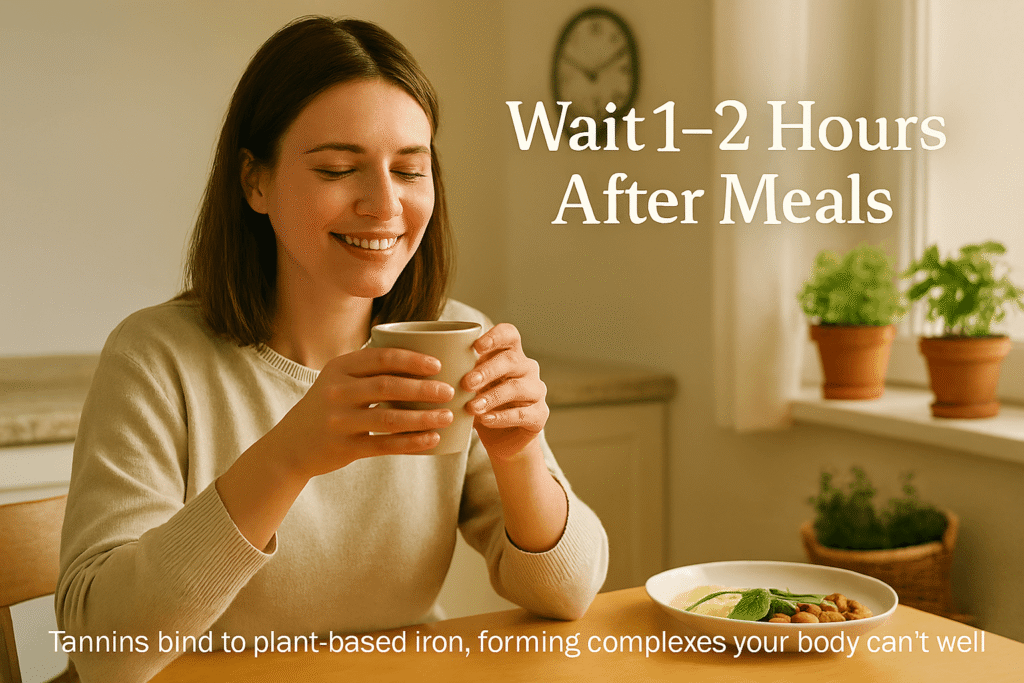
- Wait 1–2 hours after a main meal before drinking tea if you’re worried about iron. This reduces interference with iron absorption. (Health, PMC)
- If you’re at risk of iron deficiency, avoid tea with iron-rich foods (spinach, lentils, fortified cereals) and take extra care to include vitamin C (lemon, orange, bell pepper) with plant iron to boost absorption. Vitamin C can counteract some effects of tannins. (PMC, Wiley Online Library)
- Prefer tea between meals (mid-morning or mid-afternoon) rather than immediately after eating.
- If you must have tea with a meal, add a vitamin-C-rich food (a small glass of orange juice or a wedge of lemon) and include an animal-source iron if your diet contains it (e.g., lean meat), which is less affected. (PMC, Wiley Online Library)
- Moderation: For most healthy people, 1–3 cups daily isn’t harmful, but if you have low iron, discuss timing with a clinician. (PubMed)
Quick sample planner (for iron-sensitive readers)
- Breakfast (7:30): Oatmeal + orange slices → Tea at 9:30 (wait 2 hours).
- Lunch (13:00): Lentil salad + bell pepper → Water with meal, tea at 15:00.
- Dinner (19:00): Chicken curry + greens → Tea at 21:00 (if desired).
Adjust timing if you take iron supplements — most guidelines recommend taking iron supplements away from tea/coffee (usually with water or vitamin C). (PMC)
Sources & further reading
(Selected high-quality references used in this article)
- Review on tannins and iron bioavailability (free access). (PMC)
- Classic clinical findings: “The effect of tea on iron absorption” (PubMed). (PubMed)
- Study on milk and gastric emptying (no major change with modest milk). (PubMed)
- Recent population evidence on tea and bone density (Frontiers Nutrition, 2024). (Frontiers)
- Recent practical nutrition guidance and discussion of matcha/iron interaction. (Health)
Important medical disclaimer
This article provides general information based on current research and is not medical advice. If you have iron deficiency, a chronic medical condition, are pregnant, breastfeeding, or are taking iron supplements or medications, talk with your doctor or a registered dietitian before changing how or when you drink tea.
Call to action
Want a printable one-page “tea timing” cheat sheet or a tailored plan based on your diet (vegetarian/vegan/omnivore)? Tell me your usual meals and I’ll make a simple schedule you can follow.



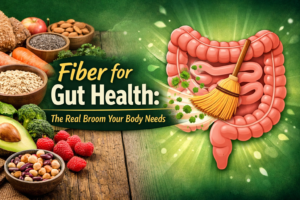
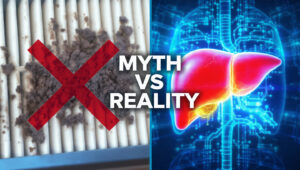

I don’t think the title of your article matches the content lol. Just kidding, mainly because I had some doubts after reading the article. https://accounts.binance.info/zh-TC/register?ref=DCKLL1YD